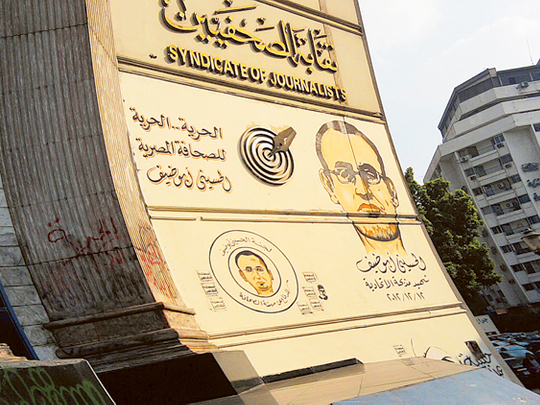
Cairo: With 11 of them killed in the country’s political turmoil since 2011, Egypt’s journalists are pushing the military-backed authorities and their union to take measures to ensure their safety.
The drive for protection has picked up pace in recent days in the aftermath of the death of Mayada Ashraf, a 22-year-old reporter working for the independent daily Al Dostour. Ashraf was shot dead on Friday while covering clashes between police and supporters of the toppled president Mohammad Mursi in the Cairo district of Ain Shams. She died of fatal gunfire injuries in the head, according to medical authorities. Police accused the pro-Mursi protesters of “targeting” Ashraf, whose paper is a vocal critic of the deposed Islamist leader’s Muslim Brotherhood. The group has vehemently denied the accusation.
“The killing of Mayada shows that journalists are targeted while doing their job in conveying the truth,” said Hazem Al Mallah, a coordinator of a non-governmental media group.
“The latest incident makes it necessary to implement steps to protect journalists on job,” Al Mallah of the Egyptian Initiative for Defence of Journalists, told Gulf News. His group is pushing for obliging Egypt’s press institutions to provide insurance for field reporters before they are assigned covering street tensions. “It is also necessary to give journalists intensive training in how to protect themselves during covering such events.”
Egypt has been gripped by deadly violence since July last year when the military ousted Mursi following enormous street protests against his troubled one-year rule. Hundreds have since been killed in the violence pitting Mursi’s backers against his opponents and security forces.
Al Malah proposes passing binding legislation for journalists’ on-job protection. “The political conflict in the country has cast a shadow on journalists’ safety. All sides, police, the Brotherhood and even citizens, are united in targeting journalists.”
While citing what he called “lack of real will” on the part of authorities and the Press Syndicate to end reporters’ killings, Al Malah said: “We have no choice other than stepping up pressure until this happens. The Press Syndicate is still weak. How can it claim to be independent while it still depends on the state financing?”
The Press Syndicate has condemned Ashraf’s killing and demanded her death be independently investigated.
“Bullet-proof vests and helmets should be provided for reporters covering violence in Egypt,’ said Hesham Younis, a member of the union’s board.
He added that chairman of the Press Syndicate Diaa Rashwan had asked interim Prime Minister Ebrahim Mehleb to make such protection gear available to reporters at reasonable prices. Younis did not disclose the premier’s response.
Since Ashraf’s death, Egyptian journalists have held a series of angry protests, demanding newspapers and TV stations to stop sending young reporters to trouble spots before giving them life insurance and proper training.
“The issue remains the same: press freedom. Mayada has been killed and the (Press) Syndicate is responsible!” chanted hundreds of protesters at the union headquarters in Cairo at the weekend.
“Eleven journalists have been killed in Egypt in three years without a single killer brought to justice or a step taken to ensure that no other victim will fall,” said Abeer Saadi, a journalist with the state-run newspaper Al Akhbar.
“Eight of the dead have been killed since June 27, 2013 amid dozens of abuses against journalists in this country, which has become the world’s third most dangerous country for journalists.”












